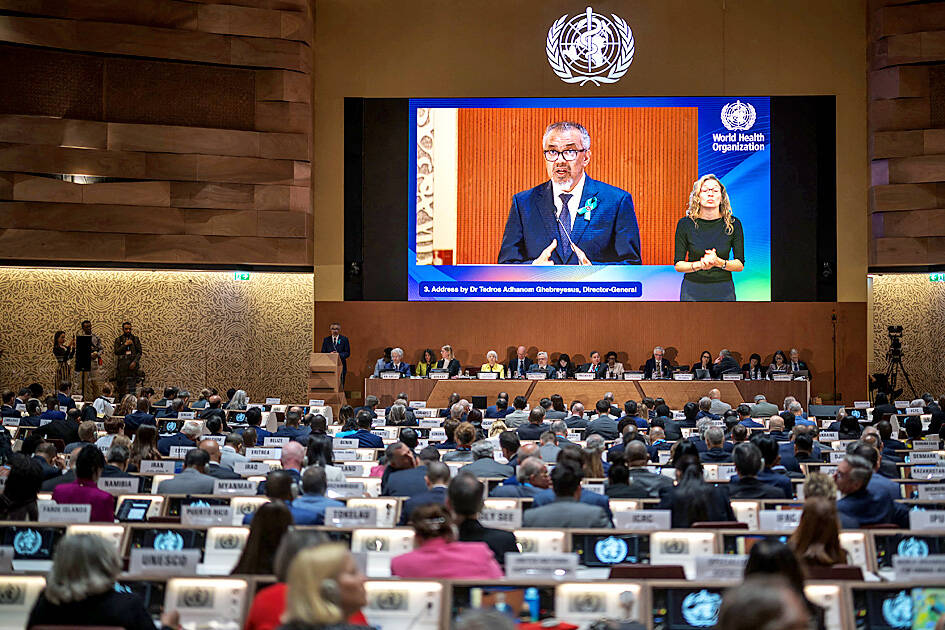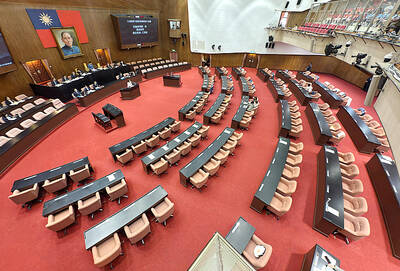The representative offices in Taiwan of eight nations yesterday issued a joint statement reiterating their support for Taiwan’s meaningful engagement with the WHO and for Taipei’s participation as an observer at the World Health Assembly (WHA).
The joint statement came as Taiwan has not received an invitation to this year’s WHA, which started yesterday and runs until Tuesday next week. This year’s meeting of the decisionmaking body of the WHO in Geneva, Switzerland, would be the ninth consecutive year Taiwan has been excluded.
The eight offices, which reaffirmed their support for Taiwan, are the British Office Taipei, the Australian Office Taipei, the Canadian Trade Office in Taipei, the Czech Economic and Cultural Office, the French Office in Taipei, the German Institute Taipei, the Japan-Taiwan Exchange Association and the Lithuanian Trade Representative Office.

Photo: CNA
As a highly capable, engaged and responsible member of the global health community, Taiwan was invited to participate in the WHA as an observer from 2009 to 2016, the statement said.
The offices praised Taiwan for its distinct capabilities and methods, including its significant public health expertise, democratic governance and advanced technology, which would bring considerable value to the WHA’s deliberations.
However, Taiwan remains largely excluded from the global international health system, the statement said.

Photo: AFP
“Taiwan’s isolation from the WHA, the preeminent global health forum, is entirely unjustified,” it said. “This undermines inclusive global public health cooperation and security, which the world demands and which is enshrined in the founding documents of the WHO.”
“As COVID-19 and continued public health crises make plain, infectious diseases and health hazards do not respect borders. Global cooperation is required to keep the whole world safe,” it said.
The offices called for Taiwan’s meaningful engagement in the WHO and participation in the WHA as an observer.
“Only by including Taiwan as an observer would the WHO be able to fully exemplify the health assembly’s commitment to ‘One World for Health,’” the statement said.
In Geneva, representatives from 11 of Taiwan’s diplomatic allies on Sunday attended a reception in support of Taiwan.
The attendees at the reception, hosted by Taiwan’s representative office in Geneva, included representatives from all but one of Taiwan’s 12 diplomatic allies, with the Holy See being the exception.
The Holy See is an observer, not a member, of the UN and rarely speaks on political issues during UN-related meetings.
At the reception, some representatives from Taiwan’s allies spoke in strong support of Taiwan’s efforts to participate in the WHA.
“I stand here today to affirm our commitment to you, our friends, that we will continue to do everything we can, in every WHA each year, to ensure that one day Taiwan will finally be given its place in the Assembly,” Palauan Vice President Raynold Oilouch said.
He also thanked Taiwan for helping to build Palau’s health infrastructure.
Haitian Minister of Public Health and Population Bertrand Sinal also expressed similar sentiments, saying that Taiwan had contributed significantly to the health infrastructure in his nation.
Taiwan also provided crucial support after the 2010 earthquake in Haiti, particularly with the operation of the National Ambulance Center, he said, adding that Taiwan is currently helping with public security in his country.
Haiti continues to stand in support of Taiwan’s participation in international organizations, he said.
The Republic of China, Taiwan’s official name, left the WHO in 1972 following a decision by UN members to expel “the representatives of Chiang Kai-shek (蔣介石),” and recognize instead the People’s Republic of China as the only “legitimate representative of China.”
Since then, Taiwan has been unable to attend the WHA, even as an observer, due to pressure from China, except from 2009 to 2016, when relations with China were warmer under the then-Chinese Nationalist Party (KMT) government.

CROSS-STRAIT COLLABORATION: The new KMT chairwoman expressed interest in meeting the Chinese president from the start, but she’ll have to pay to get in Beijing allegedly agreed to let Chinese Nationalist Party (KMT) Chairwoman Cheng Li-wun (鄭麗文) meet with Chinese President Xi Jinping (習近平) around the Lunar New Year holiday next year on three conditions, including that the KMT block Taiwan’s arms purchases, a source said yesterday. Cheng has expressed interest in meeting Xi since she won the KMT’s chairmanship election in October. A source, speaking on condition of anonymity, said a consensus on a meeting was allegedly reached after two KMT vice chairmen visited China’s Taiwan Affairs Office Director Song Tao (宋濤) in China last month. Beijing allegedly gave the KMT three conditions it had to

‘BALANCE OF POWER’: Hegseth said that the US did not want to ‘strangle’ China, but to ensure that none of Washington’s allies would be vulnerable to military aggression Washington has no intention of changing the “status quo” in the Taiwan Strait, US Secretary of Defense Pete Hegseth said on Saturday, adding that one of the US military’s main priorities is to deter China “through strength, not through confrontation.” Speaking at the annual Reagan National Defense Forum in Simi Valley, California, Hegseth outlined the US Department of Defense’s priorities under US President Donald Trump. “First, defending the US homeland and our hemisphere. Second, deterring China through strength, not confrontation. Third, increased burden sharing for us, allies and partners. And fourth, supercharging the US defense industrial base,” he said. US-China relations under

The Chien Feng IV (勁蜂, Mighty Hornet) loitering munition is on track to enter flight tests next month in connection with potential adoption by Taiwanese and US armed forces, a government source said yesterday. The kamikaze drone, which boasts a range of 1,000km, debuted at the Taipei Aerospace and Defense Technology Exhibition in September, the official said on condition of anonymity. The Chungshan Institute of Science and Technology and US-based Kratos Defense jointly developed the platform by leveraging the engine and airframe of the latter’s MQM-178 Firejet target drone, they said. The uncrewed aerial vehicle is designed to utilize an artificial intelligence computer

The Chinese Nationalist Party (KMT) caucus yesterday decided to shelve proposed legislation that would give elected officials full control over their stipends, saying it would wait for a consensus to be reached before acting. KMT Legislator Chen Yu-jen (陳玉珍) last week proposed amendments to the Organic Act of the Legislative Yuan (立法院組織法) and the Regulations on Allowances for Elected Representatives and Subsidies for Village Chiefs (地方民意代表費用支給及村里長事務補助費補助條例), which would give legislators and councilors the freedom to use their allowances without providing invoices for reimbursement. The proposal immediately drew criticism, amid reports that several legislators face possible charges of embezzling fees intended to pay